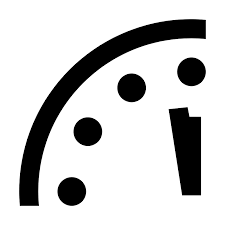The end is near
And always has been
People have been predicting the imminent end of the world for a long time. They've always been wrong. One would think the doomsayers would learn from the failures of their predecessors. But they don't. This time it's for real, they say.
Predictions of the end are akin to conspiracy theories. The doomies know something others don't. Believing the predictions makes them feel smarter and better informed. Knowledge has always been power, and no knowledge is more important than a heads-up regarding the end of the world. As the end approaches, the doomies smugly observe the ignorant making plans for a time that will never happen.
Apocalypses have commonly been religious in prospect. In these cases, the end of the world refers to the end of the world as it is currently configured. A new and better world will follow. Early Christians believed Jesus was coming back soon and would sweep them up to heaven with him. Jews have long awaited the coming of the Messiah, who will usher in an age of peace and brotherhood. Muslims anticipate the Mahdi, who will herald the second coming of Jesus. Buddhists foretell the final incarnation of the Buddha.
These mainstream religions are old by now. The millenarians among them are no longer holding their breath. The Catholic Church felt obliged to denounce millennialism as perverse and misleading.
But new versions pop up all the time. The Taiping rebellion in China in the mid-19th century proclaimed what its leader, who claimed to be the brother of Jesus, called the Heavenly Kingdom. The cult of the Ghost Dance among American Indians in the late 19th century promised the revival of Indians killed in battle against whites and the return of territory lost since the whites' invasion of North America.
Some doomsayers could be quite specific. William Miller, an American prophet of the end times, had his followers circle their calendars for October 22nd, 1844. After what they called the "Great Disappointment," the Millerites found less dramatic denominations to join.
Like everything else in modern times, notions of the apocalypse have grown more secularized. The atom bomb and the ensuing arms race threatened annihilation in the blink of a nucleus. The Bulletin of the Atomic Scientists put a new spin on Millerite specificity, conjuring a "doomsday clock" that was set at minutes or even seconds before midnight. Wisely the scientists left out the date.
The latest take is the concern over climate change and global warming. Here the worrisome measure is not a time or a date, but a thermometer reading. At 1.5° Celsius above pre-industrial times, modern civilization will survive, if uncomfortably. At 2° or 3° or more, all bets are off.
Beyond the appeal of thinking they know something other people don't, the apocalypticians portray in exaggerated form something common in just about every generation of humans. Each generation tends to think of itself in the superlative degree: the most enlightened, the most corrupt, the most stressed, the most divided. Dickens described the phenomenon in that long opening sentence of A Tale of Two Cities. "It was the best of times, it was the worst of times . . ." Every generation is tempted to think that the point of history was to produce the world they inhabit. The doomies carry the temptation further. History was not only leading up to this moment; it was designed to conclude in this moment. We are the closing act of humanity; we must be really important.
Just because the doomsayers have always been wrong doesn't mean they always will be wrong. Presumably the world will end sometime or other. If people keep predicting the end, sooner or later they'll get it right. In the meantime, what's the harm?
We could put that question to the followers of Jim Jones—if they hadn't all committed suicide in 1978 in Guyana. Or to the Ghost Dancers who thought their millennial magic would protect them from the soldiers' bullets that instead massacred them at Wounded Knee in 1890. Or to the 20 million who died in the Taiping Rebellion.
The sad historical fact is that doomsday cults almost always end badly. They threaten the status quo of politics, society and religion, and it is in the nature of the status quo to defend itself. At the least, in their obsession with the world to come they distract their adherents from practical measures that might make this world better. James Watt, Ronald Reagan's secretary of the interior, was the nation's chief steward of natural resources. But his time-horizon of stewardship appears to have been colored by his theology. “I do not know how many future generations we can count on before the Lord returns,” Watt said. His willingness to let loggers cut and oil drillers drill about as fast as they wanted reflected this view. Why preserve America's natural heritage for our great grandchildren if there aren't going to be any?
“Eat, drink and be merry, for tomorrow we may die,” said Epicurus. And so we may. But we may not. If history is any guide, we probably won’t. We’re not that special.


We seem to be living right now through a sort of doomsday cult in the USA in which the end of America is imminent unless MAGA succeeds.
To paraphrase some of what Margaret Meade wrote of her studies of the cultural aspects of aging and death, I will postulate that, in our culture at least, as we get older, thinking that the next generation is not as good as ours or previous and that the world is going to hell in a hand basket makes it easier for us to accept our own deaths and that we will soon be checking out of here.